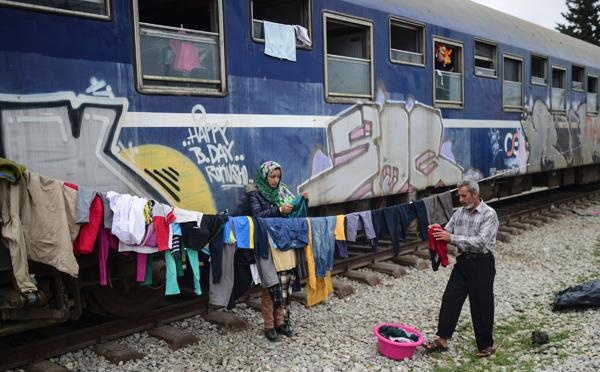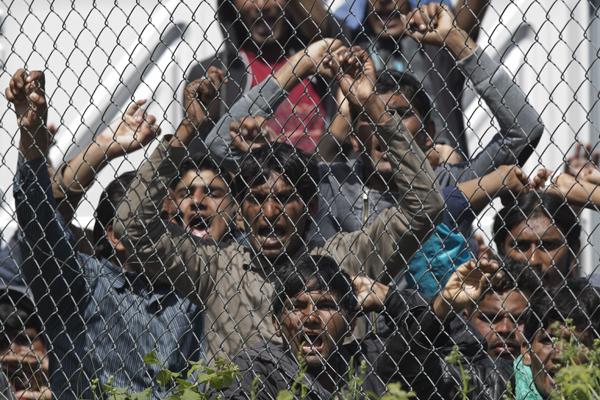You are here
Uncertainty prevails on day before Greece starts returns of migrants
By Reuters - Apr 03,2016 - Last updated at Apr 03,2016

A man and his daughter hang their clothes at a makeshift camp in Idomeni on Sunday, while thousands of migrants and refugees are stranded by the Balkan border blockade (AFP photo)
LESBOS, Greece/CESME, Turkey — There was little sign of preparation on either side of the Aegean less than 24 hours before Greece was due to begin returning migrants to Turkey, and Greek and Turkish officials gave conflicting information on the logistics of the plan.
The returns are a key part of an agreement between the European Union and Turkey aimed at ending the uncontrollable influx into Europe of refugees and migrants fleeing war and misery in the Middle East, Asia and Africa.
Under the deal, those who cross into Greece illegally will be held and sent back once their asylum applications are processed. For every Syrian returned, one Syrian will be resettled to Europe directly from Turkey.
So far, more than 6,000 migrants and refugees have been registered on Greek islands since March 20, the date on which the agreement came into force. Where they will depart from, to where they will be sent, and even how many people will be taken back to Turkey under this deal on Monday, remains unclear.
On Sunday, there were few signs that Lesbos, the island hundreds of thousands of people passed through on their way to northern Europe, was getting ready to send back migrants. A police spokesman said the force was still awaiting instructions.
Across the Aegean in the coastal town of Dikili, which a Turkish official said would receive refugees sent back from Greece, just two room-size tents were set up on the pier of its cramped port on Saturday. Two portable toilets were installed nearby.
Further south, four small blue tents were set upon the town of Cesme for those sent back from the Greek island of Chios.
Turkey's interior minister, Efkan Ala, was quoted by the pro-government newspaper Aksam as saying 500 people were expected in Turkey from Greece on Monday. Afghans, Iraqis and Pakistanis would be deported to their countries, he said.
The Athens News Agency reported over the weekend that the returns would begin on Monday morning on two Turkish passenger ships chartered by Frontex, the EU border agency. Some 250 people would be returned each day through Wednesday, the report said, without citing sources.
"Planning is in progress," George Kyritsis, a Greek government spokesman for the migration crisis told Reuters. "I will not confirm any report."
Kyritsis said returns would take place on Monday, "barring any massive hurdle which cannot be overcome", but they would not be of people who have applied for asylum. The numbers being floated "had come out of thin air", he said.
‘Challenging and volatile’
More than 51,000 migrants and refugees remain in Greece since border closures along the Balkans last month. Hundreds of migrants who on Friday broke out of the Chios holding facility in protest at the deal are at the island's port. Hundreds of migrants in mainland Greece are also protesting to demand the borders open.
Arrivals to the islands remained steady on Sunday, two weeks since March 20, with 514 migrants, including many Syrians and Iraqis, crossing from Turkey through Sunday morning. Of those, 364 arrived on Lesbos, authorities said.
Many of those rescued by the Greek coast guard off Lesbos were unaware they would be sent back to Turkey.
Greece's parliament passed an asylum amendment bill on Friday needed to implement the agreement. The legislation does not explicitly designate Turkey as a "safe third country" — a formula to make any mass returns legally sound.
The UN refugee agency (UNHCR) and human rights groups have denounced the agreement as lacking legal safeguards. Amnesty International called it "a historic blow to human rights" and said it would send a delegation to Lesbos and Chios on Monday to monitor the situation.
UNHCR's spokesman on Lesbos, Boris Cheshirkov said there were still gaps in both Greece and Turkey that need to be addressed.
"We're not opposed to returns as long as people are not in need of international protection, they have not applied for asylum," he said.
Related Articles
ATHENS — Greek authorities were gearing up on Saturday to send hundreds of failed asylum-seekers back to Turkey, which is racing to set up r
LESBOS — Police fired tear gas at protesting migants on Monday on Lesbos, a Greek island on the frontline of the migrant crisis, an AFP phot
ANKARA/LESBOS, Greece — Turkey is ready to take in another 200 migrants deported from the Greek islands this week, a senior government offic












